Chike and the River
 Rushes to the end a bit with a lack of impact but definitely a worthwhile read that's similar to Steinbeck's short works about discovering the world, such as The Red Pony.
Rushes to the end a bit with a lack of impact but definitely a worthwhile read that's similar to Steinbeck's short works about discovering the world, such as The Red Pony.
Being Henry David
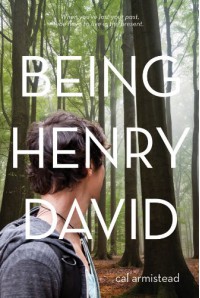 Loved the opening where the story borders on strange and threatening. The use of Thoreau is interesting and I enjoyed the motorcycle librarian who wanders around Walden pond. The closing sequence in the woods of Maine, without spoiling things, was more satisfying to me than the climax of the plot. I wish Henry had spent more time in nature but then it would be a different book. Also, reading of his attempts to apply Thoreau's various life philosophies in social situations gave me, a Thoreau nerd, a thrill since the notorious loner was actually social. (He wouldn't have cared about politics if he didn't have a strong interest in people or society.)
Loved the opening where the story borders on strange and threatening. The use of Thoreau is interesting and I enjoyed the motorcycle librarian who wanders around Walden pond. The closing sequence in the woods of Maine, without spoiling things, was more satisfying to me than the climax of the plot. I wish Henry had spent more time in nature but then it would be a different book. Also, reading of his attempts to apply Thoreau's various life philosophies in social situations gave me, a Thoreau nerd, a thrill since the notorious loner was actually social. (He wouldn't have cared about politics if he didn't have a strong interest in people or society.) Everybody Loves Our Town: An Oral History of Grunge
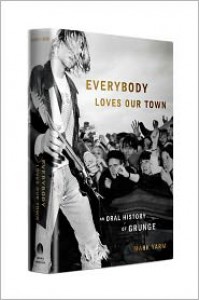 A fantastic history of the Seattle music scene labelled grunge. Yarm's strength, aside from the wealth of material he culled from his interview subjects, is the fact that he knows the scene. The book begins back in the early 80s and successfully traces the rise of the huge bands as well as the ones (like TAD) that could've made it big but didn't for reasons random, sometimes cruel, sometimes understandable, but ultimately fascinating.
A fantastic history of the Seattle music scene labelled grunge. Yarm's strength, aside from the wealth of material he culled from his interview subjects, is the fact that he knows the scene. The book begins back in the early 80s and successfully traces the rise of the huge bands as well as the ones (like TAD) that could've made it big but didn't for reasons random, sometimes cruel, sometimes understandable, but ultimately fascinating.Working with the structure of an oral history still leaves Yarm room to create a narrative. Juxtaposing contradictory perspectives allows for a certain sense of tribulation -- who do we believe if there are only two presentations of an event? Well, Yarm's done us the service of staying out of the way. Put another text might make conclusions based on the comments/quotes, but Yarm emphasizes that the issue here isn't really the factual trajectory of the individuals, but the overall movement. For example, who knows if Courtney Love is telling the truth. Ever. And who knows if anyone talking about Courtney Love is telling the truth or has a grudge. I want to give people the benefit of the doubt, but ultimately how people talk about the scene tells you more than the facts. Maybe that's not what everyone expects but if you go in looking for a beautiful mix of insider gossip, facts, perceptions, and caricature (not one of those things but all).
A highly satisfying presentation that moves quickly and doesn't seem to lack anything essential (except maybe Chris Cornell's post-Soundgarden decent into drugs and alcohol, though I suspect the blind spot was intentional and not due to a lack of interest or work on Yarm's part).
SPOILER ALERT!
The Song of Achilles
 Such a well constructed story. I was just bummed by the exclusion of two thins towards the end though only one was, in my opinion, crucial to the true emotional completion if Achilles character. In The Iliad Priam reminds Achilles of his father and they both weep ove all they've lost. its that fact -- I believe -- this book needs to complete the story. Achilles loses his romantic love and he also is never going to see his father again. Achilles loses everything for his military fame. He has to weep.
Such a well constructed story. I was just bummed by the exclusion of two thins towards the end though only one was, in my opinion, crucial to the true emotional completion if Achilles character. In The Iliad Priam reminds Achilles of his father and they both weep ove all they've lost. its that fact -- I believe -- this book needs to complete the story. Achilles loses his romantic love and he also is never going to see his father again. Achilles loses everything for his military fame. He has to weep. I like that Miller has put together a cohesive, convincing, and emotionally real story of Patroclus. Just felt like the ending missed a key opportunity with Achilles.
Forgive Me, Leonard Peacock
 (disclaimer: Matthew Quick and I are good friends. But that's not why I love this book.)
(disclaimer: Matthew Quick and I are good friends. But that's not why I love this book.)Put simply, this is an intense, gripping portrayal of a teenage boy who decides to kill his former best friend. Fans of Quick's previous work will sense, immediately, that this is something of a tonal shift, though all of Quick's narrators find themselves in emotionally challenging, often dark, places. In this case, though, we're introduced to Leonard Peacock -- a boy who's in a darker place than we've ever seen in prior books by the author. Amber, of SORTA LIKE A ROCK STAR, certainly has her depression midway through her novel. But Leonard is an all encompassing, authentically sad and angry character.
He has reason to be.
I can't review the bulk of this book without spoiling plot elements. If the setup doesn't grip you, then know that the other hallmark's of Quick's work -- a unique, engaging voice; earned emotional moments; visual descriptions that linger long after the story's done -- are present. This is not a departure, a change, a reinvention of Quick's path as an author. This is the best exploration of a teenager's angry despair that you may ever read.
Butter
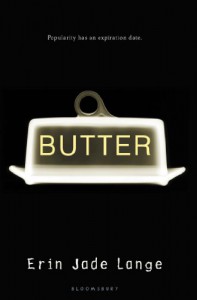 Lange's debut novel works with a profound mixture of crucial topics: obesity, bullying, the power of the internet, parenting woes, and the power of music. If you suspect this book is a mess because it attempts to work all of these ingredients together, you suspect wrong. (Also, that's my only food related metaphor for this review. I promise. Oh wait, Promise is a non-dairy spread. argh!)
Lange's debut novel works with a profound mixture of crucial topics: obesity, bullying, the power of the internet, parenting woes, and the power of music. If you suspect this book is a mess because it attempts to work all of these ingredients together, you suspect wrong. (Also, that's my only food related metaphor for this review. I promise. Oh wait, Promise is a non-dairy spread. argh!)Back on target.
Butter, the protagonist, walks a fine line of being sympathetic and unsympathetic. He's obese and relatively okay with it, though plenty of things in his life cause him to question his lifestyle. It's not difficult to see why he's complacent, since his mother obsesses over his eating habits but seems incapable of controlling his diet in a meaningful way (aside from cutting out sugar at one point). I could see a version of this book wherein Butter drives readers away, but there's something about him that's vulnerable without being forced. Butter doesn't begin to change his behavior until he finds an online forum featuring comments from his friends at school, who vote him Most Likely to Die of a Heart Attack. He's forced to see himself through the eyes of his peers -- and the internet certainly can make that feeling sharp and profound. He doesn't like what he sees (and reads). So he decides to give up.
Now, it's never completely clear whether Butter truly meant to kill himself live on New Year's Eve or if he meant to just create another buffer around himself by showing people he knew what they said/thought about him. Butter goes back and forth, which means I go back and forth as well. In the end, it doesn't matter what his INITIAL intention is, just what he ultimately chooses to do. I think the book succeeds because of Butter's ambivalence to his own decision. The threat to kill himself, though, needs to feel possible, and Butter gathers information that suggests he is planning his suicide, though, he's more than willing to back off when something positive happens in his life (weight loss, cute girl is nice to him, etc).
In many ways, the specter of death is one of the most crucial aspects of life's meaning. Without death, life carries on endlessly. Death forces us to ponder meaning, purpose, morality, and more, simply because we know we'll run out of time eventually. (Anyone who's read any Modernist literature knows the importance of death to literary characters. It's the fuel for much philosophizing.)
Here, Butter decides to eat himself over the edge and it causes him to change his behavior. He gains popularity, gains access to the girl he's had a crush on from afar (and a relationship over the internet), he gains a sense of worth. All because he decided his life had no worth.
As the plot progresses, Lange rightly focuses on Butter and his struggle as opposed to the various social issues the novel threads together. I found his complexity and hypocrisy very satisfying more so because Lange does not obsess on certain aspects of the story -- the power of the internet, as well as parenting woes. In lesser hands, a certain amount of moralizing and demonizing would occur to be sure the reader understood that the internet is bad or that parents are just "doing their best." While I can't answer for other readers, I never felt Butter's parents were simply good or bad, just frustrated (and, for me, frustrating in their believable behaviors). Nor did I find Butter's experience on the internet to be a judgment of the internet itself, (though it plays a huge role in Butter's self-esteem issues, Lange is clear that the internet both enhances and harms his self-worth).
I think Butter is a fantastic addition to books about suicide and bullying because it doesn't pander and it allows its characters to be real, especially towards the climax when Butter and Anna have a few key conversations. While the ending might feel a little too happy, I believe Lange earns the feelings because she wasn't afraid to let Butter be real in the rest of the novel.
Geeks, Girls and Secret Identities
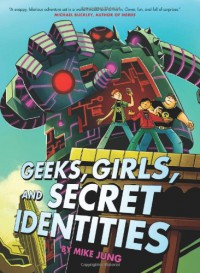 A great, fun ride that does some playful stuff with superhero-ing. Polly and Vincent make for the most interesting duo of the cast. I love the complex use of Vincent's mom and dad (especially since the plot doesn't involve any silly twists -- I won't say more to avoid spoilers.)
A great, fun ride that does some playful stuff with superhero-ing. Polly and Vincent make for the most interesting duo of the cast. I love the complex use of Vincent's mom and dad (especially since the plot doesn't involve any silly twists -- I won't say more to avoid spoilers.) I'm curious to see if Jung explores this world more.
Variant
 Fast paced with the kind of ending that makes me glad the sequel is right around the corner, VARIANT is a great great read. Benson, the hero, has the right combination of brains and charm to carry the storyline through its twists and turns. Wells does a great job balancing the temptations of the Academy lifestyle being offered with Benson's skepticism and almost too selfish desire for escape. The moral repercussions of this book will certainly carry over and complicated Benson Fishers's journey.
Fast paced with the kind of ending that makes me glad the sequel is right around the corner, VARIANT is a great great read. Benson, the hero, has the right combination of brains and charm to carry the storyline through its twists and turns. Wells does a great job balancing the temptations of the Academy lifestyle being offered with Benson's skepticism and almost too selfish desire for escape. The moral repercussions of this book will certainly carry over and complicated Benson Fishers's journey. Billy Lynn's Long Halftime Walk
 I'm not sure how to review this book without gushing and thus losing the chance to convince people to read this novel. So, know my goal is to encourage people to read this book; I will not summarize plot. I will try to contextualize why I think this book is worth your time.
I'm not sure how to review this book without gushing and thus losing the chance to convince people to read this novel. So, know my goal is to encourage people to read this book; I will not summarize plot. I will try to contextualize why I think this book is worth your time.Perhaps it's just one of those "perfect timing" novels where I found exactly the kind of book I wanted at the right time. Fountain's novel swept me along and I never wanted it to end. The climax is fascinating and surprising and nearly perfect. If you have any interest in novels about 21st century American culture -- teh culture of money and competition and violence and spin, then this book will satisfy you. It is a book about soldiers and war, but not in a warzone. It's a book about friendship and family and the things that give people a reason to keep going.
To keep it simple: BILLY LYNN'S LONG HALFTIME WALK truly does feel like a CATCH-22 for the Iraq War (as one of the blurb proclaims). Now, that's a heavy burden for a book, since CATCH-22 is a classic of war satire (in fact, is it one of the only war satires? LYSISTRATA comes to mind, but I blank on others at the moment).
Let me also say that I am a rabid Tim O'Brien fan. Any fiction I read about war is always read through the filter of THE THINGS THEY CARRIED. Ben Fountain's novel manages to coexist with O'Brien's philosophy on stories about war. Mainly because this is a novel about how America views itself during wartime. Billy Lynn, rather than being an O'Brien-esque story-spinner trying to make sense of his experience is, instead, a semi-sober critic of American culture. He spends the bulk of the novel trying to reconcile what he's fighting for with what he sees during the course of a 2 week 'victory tour' with the rest of his unit. Yes he struggles with the purpose of the war, but he also quickly realizes what O'Brien's short story collection contends: a soldier cannot explain the war experience to civilians. (Hemingway's IN OUR TIME argues this as well).
So, while he does spend some time pondering his life, his future, and his family in a particularly effective chapter, Billy Lynn can spend more time wondering how the Americans flooding Texas Stadium for the Thanksgiving Day game can be so happy and dumb. As Lynn points out: "Somewhere along the way America became a giant mall with a country attached." It's one of his many great DeLillo-esque observations that might seem "out of character" for a 19 year old from a small town in Texas, except that Shroom -- one of the casualties of the battle in Iraq that made Billy & his unit famous -- certainly pointed him towards deeper thinking.
A fantastic book. One I'll make time to read again.
SPOILER ALERT!
I Am Not A Serial Killer (John Cleaver Books)
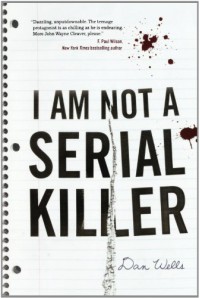 So, it's nearly impossible to review a book like this without spoilers. I'll do the best to keep spoilers vague, though, because I think this is a really fun and satisfying book. and would prefer people pick it up knowing only what the book description says.
So, it's nearly impossible to review a book like this without spoilers. I'll do the best to keep spoilers vague, though, because I think this is a really fun and satisfying book. and would prefer people pick it up knowing only what the book description says. I AM NOT A SERIAL KILLER is not exactly a serial killer book and yet it is.
(This as spoilery as I get:
More importantly, it's not exactly a book that hinges on the "WHOH!" moment, because that moment comes about 100 pages into the novel.So, it's not a twist ending. It's not miscategorized, and yet I can see people getting on board because they like the idea of a sociopathic narrator fighting the urge to kill.
But, let's be honest, the author knows you can't write 200+ pages about a teenager trying NOT to kill. it would not satisfy. it might be a decent enough literary exploration of murderous urges, but even CRIME & PUNISHMENT has the murder and then the guilt. (oh, the guilt.) So, to withhold murder from a straightfoward book about a sociopathic teenager would be a failure.
Thus, the plot of I AM NOT A SERIAL KILLER. it's beyond the easy "just make the victims worthy of being killed" (ie, the Dexter plot).)
While the ending does hinge a bit too much on setup for the next book (this is part 1 of 3), I found the story engaging, fast paced, and easy to fall into. If you're the kind of person that gets upset about believability and accuracy, this book probably won't work for you. But if you're the kind of person that sets aside issues with "Would that really be how a therapist acts" or "This kid is SO not a sociopath!" or "That's not how Dexter would do it!" then you will ENJOY this book. Which is what matters.
I Will Save You
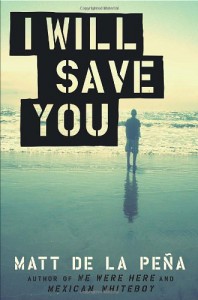 Matt de la Peña's I WILL SAVE YOU contains some precise and fantastic emotional moments, particularly between Kidd and his mother. A great cast of characters helps move this book along at a rapid pace, leading the reader through a journey of recovery that's also one of destruction.
Matt de la Peña's I WILL SAVE YOU contains some precise and fantastic emotional moments, particularly between Kidd and his mother. A great cast of characters helps move this book along at a rapid pace, leading the reader through a journey of recovery that's also one of destruction.I enjoyed Kidd's narrative voice, but the banter between he and Mr. Red made the strongest impact. In fact, I'd argue Mr. Red is the hidden gem of this book, (though perhaps I say that because I'm not a teen reader and can connect readily to Red's backstory and motivations a little better). Regardless, the author has managed to create one of those great adult characters that's believable and flawed without resorting to stereotypes or silly twists.
I'm off to read more by Matt de la Peña. I suggest you check him out NOW.
Angels
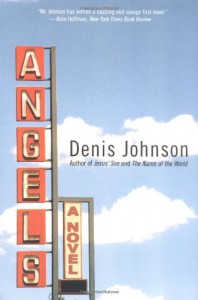 This is the kind of book Charles Bukowski wished he could write but never had the sentence-level talent to pull off. At least, that's what I thought when I was about half way through. Then this book takes a sudden turn into insanity. Which is both good and bad. In the final third of the book, Johnson conducts a frantic dismantling of his characters -- Jamie loses her mind; Bill loses his freedom. But it's done in such a way that they are parallel sufferers. In fact, I'd argue the book approaches commenting on the way men and women living on the fringe suffer. And while the conclusion is not cynical, it does seem to linger on the experience of Bill and his brothers moreso than Jamie, despite the fact that Jamie's journey is, in my view, the more compelling one.
This is the kind of book Charles Bukowski wished he could write but never had the sentence-level talent to pull off. At least, that's what I thought when I was about half way through. Then this book takes a sudden turn into insanity. Which is both good and bad. In the final third of the book, Johnson conducts a frantic dismantling of his characters -- Jamie loses her mind; Bill loses his freedom. But it's done in such a way that they are parallel sufferers. In fact, I'd argue the book approaches commenting on the way men and women living on the fringe suffer. And while the conclusion is not cynical, it does seem to linger on the experience of Bill and his brothers moreso than Jamie, despite the fact that Jamie's journey is, in my view, the more compelling one. Worth reading if you like reading about life on the fringe -- expect drugs, miserable sex, and the easy mistakes of violent crime. Also, Denis Johnson writes some damn fine sentences.
Hold Still
 A very authentic and emotional story of a girl who wants an explanation for her best friends suicide. More than that she needs to learn how to process grief and how others process their grief. This is definitely a tough story with a tough main character- Ingrid has already killed herself before the novel begins so all of the memories and journal entries Caitlin reads are steeped in sadness. This is not a flaw. The fact that LaCour can so clearly and firmly carry the reader through Caitlin's journey is a testament to her as a writer. Perhaps the novel can only truly be appreciated by those who have suffered the grief of a friend or family member's suicide. Perhaps. But if you're interested in a real accessible sad but ultimately rewarding novel about a girl who has no choice but to move on, pick this up.
A very authentic and emotional story of a girl who wants an explanation for her best friends suicide. More than that she needs to learn how to process grief and how others process their grief. This is definitely a tough story with a tough main character- Ingrid has already killed herself before the novel begins so all of the memories and journal entries Caitlin reads are steeped in sadness. This is not a flaw. The fact that LaCour can so clearly and firmly carry the reader through Caitlin's journey is a testament to her as a writer. Perhaps the novel can only truly be appreciated by those who have suffered the grief of a friend or family member's suicide. Perhaps. But if you're interested in a real accessible sad but ultimately rewarding novel about a girl who has no choice but to move on, pick this up. I also highly recommend her second novel, THE DISENCHANTMENTS.
Little Velázquez
 Historical fiction always worries me. I love learning about different places, different times, different political systems, etc, but I don't like reading history disguised as fiction. Nor do I think fiction should be shackled by historical accuracy. Don't sacrifice a good scene because it didn't happen that way in real life. And don't excuse bad storytelling because that's how it DID happen.
Historical fiction always worries me. I love learning about different places, different times, different political systems, etc, but I don't like reading history disguised as fiction. Nor do I think fiction should be shackled by historical accuracy. Don't sacrifice a good scene because it didn't happen that way in real life. And don't excuse bad storytelling because that's how it DID happen. Kathryn Kopple's forthcoming novel LITTLE VELÁSQUEZ never left me feeling like I picked up a book from the wrong section of the bookstore. Velasquillo, the heart of the novel (but certainly not the the only character we get to know intimately), emanates a charm and loneliness throughout the novel. These two qualities are not just interesting because of his character -- though he certainly crystalizes very quickly and remains true and real throughout -- they are qualities that tie the various people in the novel together.
This novel focuses on the court of Fernando and Queen Isabel of Castile (you know, the one that funded Columbus, expelled the Jews and Muslims, and probably yelled at adorable kittens in her free time). Velasquillo manages to trick his way into being the court fool and the novel happily doesn't stick only to his POV. We're inside the heads of Isabel, her Marquesa de Moya, her daughter Juana, and others. This is key, because it shows just how pervasive loneliness is. This novel isn't simply about the loneliness of power. It's human disconnection. It's an exploration of how, at various levels in society (perhaps today's, but at least in the society of the novel), people are disconnected, unable to communicate, easily fooled, and easily fail.
Constructed to cover the ten year siege of Grenada, one might feel like time moves a bit too brisky from section to section, but Velasquillo and, to my surprise, the Queen herself, keep things connected and clear.
One of the features I enjoyed most is Kopple's sentences. She's never dry, clearly knows her time period well, but doesn't twist her words around your neck.
I leave you with this excellent passage from the prologue as evidence of how much fun this book is to read:
"He didn't need a physician, didn't want one. He wanted only to be young again. How tired he was of hauling his old carcass about; so sick of the sight of wrinkles and spots. He wanted to frolic among the great, wise oaks, to urinate with glee, to feel some heat in his loins. What good did it do him to possess a body unlike any other body, one that amused and amazed, when, inside, he was no different at all--and perhaps worse off than many. He would die like any other man, in a heap of rotting teeth and flesh, with fetid breath, no less. No less.
A Monster Calls
 A phenomenal, gut-wrenching book about a monster that comes to a boy not to scare him, but to tell him three stories. The boy, Conor, needs the stories, but "stories are the wildest things of all" the monster says. They will not be simple.
A phenomenal, gut-wrenching book about a monster that comes to a boy not to scare him, but to tell him three stories. The boy, Conor, needs the stories, but "stories are the wildest things of all" the monster says. They will not be simple. It's impossible to say more about A MONSTER CALLS without ruining it except to say that buying the physical book -- a beautiful hardcover with amazing illustrations -- is necessary. It's a heavy book with a sad, strong story.
Echolocation: a novel
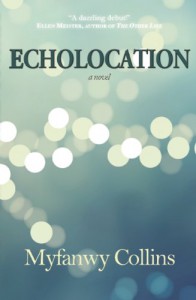 ECHOLOCATION by Myfanwy Collins has me thinking about fission. At first I thought of the collapsing of the universe, but, without giving away too many spoilers, this is more about the collision of distinct, related women and the resulting release of energy. There is destruction and creation in the series of events. Examples of gain from loss begin in the opening pages when Geneva (the main character and the most morally compelling) loses her arm but gains freedom.
ECHOLOCATION by Myfanwy Collins has me thinking about fission. At first I thought of the collapsing of the universe, but, without giving away too many spoilers, this is more about the collision of distinct, related women and the resulting release of energy. There is destruction and creation in the series of events. Examples of gain from loss begin in the opening pages when Geneva (the main character and the most morally compelling) loses her arm but gains freedom. I think the greatest momentum in the novel is created by the consistent PRESENCE of the PAST. This particular aspect of the novel reminds me of Alice Munro, whose characters seem like mental time travelers, moving between now and then. Collins juggles Renee, Cheri, and Geneva and I'm curious what she'd be able to do with just one character put under the microscope of her sentences.
The closing ~30 pages is quite interesting as it reveals more memories than I expected from the climax of the novel, cementing Geneva as the emotional core of the novel, the potentially tragic figure, and the one who still lingers after I've shut the book.






